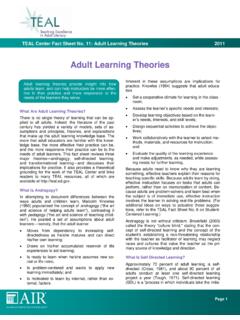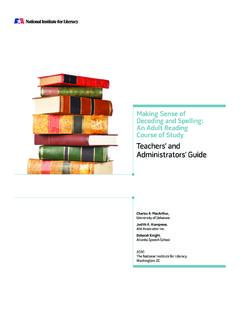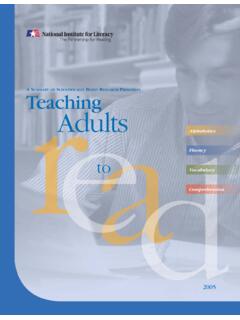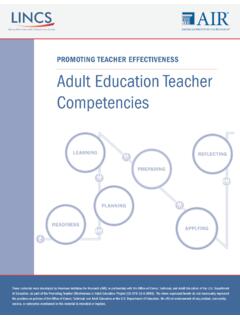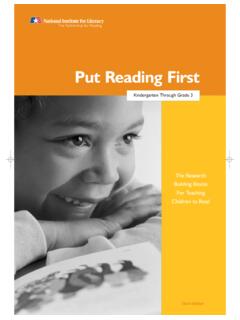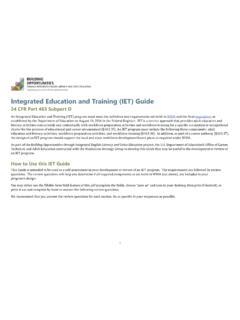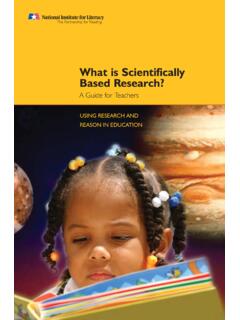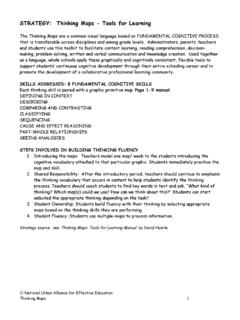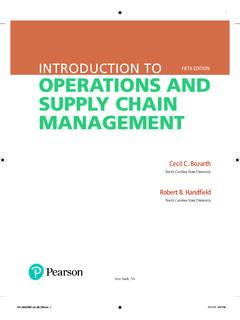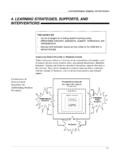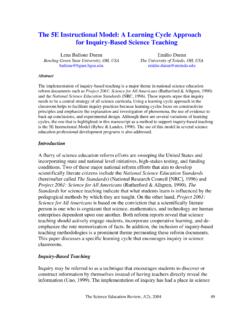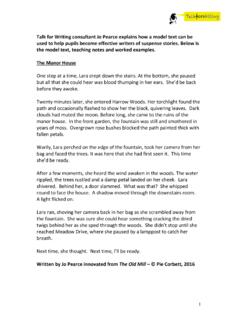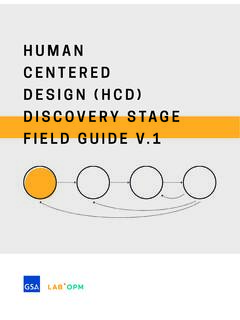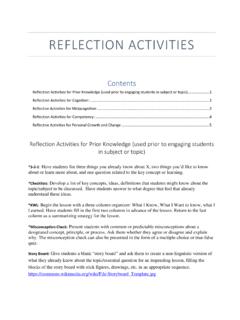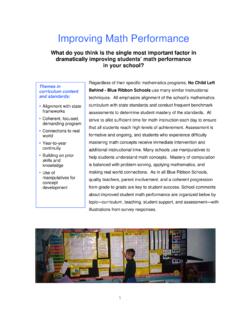Transcription of Metacognitive Processes - ed
1 TEAL Center Fact Sheet No. 4: Metacognitive Processes 2010 Page 1 Metacognitive Processes What Is Metacognition? Metacognition refers to awareness of one s own knowledge what one does and doesn t know and one s ability to understand, control, and manipulate one s cognitive Processes (Meichenbaum, 1985). It includes knowing when and where to use particular strategies for learning and problem solving as well as how and why to use specific strategies. Metacognition is the ability to use prior knowledge to plan a strategy for approaching a learning task, take necessary steps to problem solve, reflect on and evaluate results, and modify one s approach as needed.
2 Flavell (1976), who first used the term, offers the following example: I am engaging in metacognition if I notice that I am having more trouble learning A than B; if it strikes me that I should double check C before accepting it as fact (1976, p. 232). Cognitive strategies are the basic mental abilities we use to think, study, and learn ( , recalling informa-tion from memory, analyzing sounds and images, making associations between or comparing/ contrast-ing different pieces of information, and making infe-rences or interpreting text).
3 They help an individual achieve a particular goal, such as comprehending text or solving a math problem, and they can be individual-ly identified and measured. In contrast, Metacognitive strategies are used to ensure that an overarching learning goal is being or has been reached. Examples of Metacognitive activities include planning how to approach a learning task, using appropriate skills and strategies to solve a problem, monitoring one s own comprehension of text, self-assessing and self-correcting in response to the self-assessment, eva-luating progress toward the completion of a task, and becoming aware of distracting stimuli.
4 Elements of Metacognition Researchers distinguish between Metacognitive knowledge and Metacognitive regulation (Flavell, 1979, 1987; Schraw & Dennison, 1994). Metacogni-tive knowledge refers to what individuals know about themselves as cognitive processors, about different approaches that can be used for learning and problem solving, and about the demands of a particular learn-ing task. Metacognitive regulation refers to adjust-ments individuals make to their Processes to help con-trol their learning , such as planning, information man-agement strategies, comprehension monitoring, de-bugging strategies, and evaluation of progress and goals.
5 Flavell (1979) further divides Metacognitive knowledge into three categories: (1) Person variables: What one recognizes about his or her strengths and weaknesses in learning and processing information; (2) Task variables: What one knows or can figure out about the nature of a task and the processing de-mands required to complete the task for exam-ple, knowledge that it will take more time to read, comprehend, and remember a technical article than it will a similar-length passage from a novel; and (3) strategy variables: The strategies a person has at the ready to apply in a flexible way to successful-ly accomplish a task.
6 For example, knowing how to activate prior knowledge before reading a tech-nical article, using a glossary to look up unfamiliar words, or recognizing that sometimes one has to re-read a paragraph several times before it makes sense. Livingston (1997) provides an example of all three variables: I know that I (person variable) have difficul-ty with word problems (task variable), so I will answer the computational problems first and save the word problems for last ( strategy variable). Why Teach Metacognitive Skills? Research shows that Metacognitive skills can be taught to students to improve their learning (Nietfeld & Shraw, 2002; Thiede, Anderson, & Therriault, 2003).
7 Metacognition is one s ability to use prior knowledge to plan a strategy for approaching a learning task, take necessary steps to problem solve, reflect on and evaluate results, and modify one s approach as needed. It helps learners choose the right cognitive tool for the task and plays a critical role in successful learning . 3 TEAL Center Fact Sheet No. 4: Metacognitive Processes 2010 Page 2 Constructing understanding requires both cognitive and Metacognitive elements. Learners construct knowledge using cognitive strategies, and they guide, regulate, and evaluate their learning using metacogni-tive strategies.
8 It is through this thinking about think-ing, this use of Metacognitive strategies, that real learning occurs. As students become more skilled at using Metacognitive strategies, they gain confidence and become more independent as learners. Individuals with well-developed Metacognitive skills can think through a problem or approach a learning task, select appropriate strategies, and make deci-sions about a course of action to resolve the problem or successfully perform the task. They often think about their own thinking Processes , taking time to think about and learn from mistakes or inaccuracies (NCREL, 1995).
9 Some instructional programs that encourage students to learn Metacognitive strategies encourage students to engage in Metacognitive con-versations with themselves so that they can talk with themselves about their learning , the challenges they encounter, and the ways in which they can self-correct and continue learning . Moreover, individuals who demonstrate a wide variety of Metacognitive skills perform better on exams and complete work more efficiently they use the right tool for the job, and they modify learning strategies as needed, identifying blocks to learning and changing tools or strategies to ensure goal attainment.
10 Because metacognition plays a critical role in successful learn-ing, it is critical that instructors help learners develop metacognitively. What s the Research? Metacognitive strategies can be taught (Halpern, 1996) and they are associated with successful learn-ing (Borkowski, Carr, & Pressley, 1987). Successful learners have a repertoire of strategies to select from and can transfer them to new settings (Pressley, Bor-kowski, & Schneider, 1987). Instructors need to set tasks at an appropriate level of difficulty, , challeng-ing enough so that students need to apply metacogni-tive strategies to monitor success but not so challeng-ing that students become overwhelmed or frustrated, and instructors need to prompt learners to think about what they are doing as they complete these tasks (Bi-emiller & Meichenbaum, 1992).
